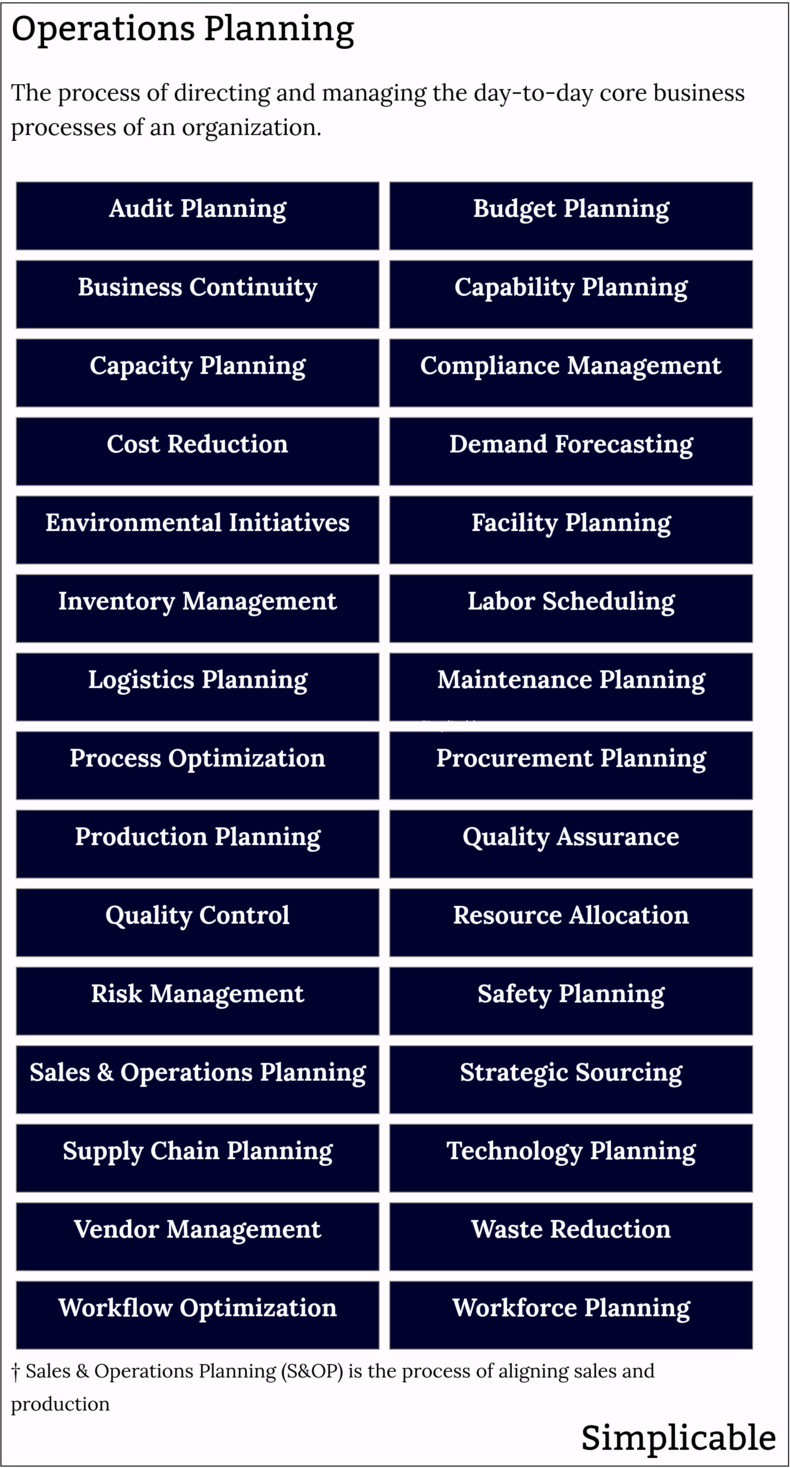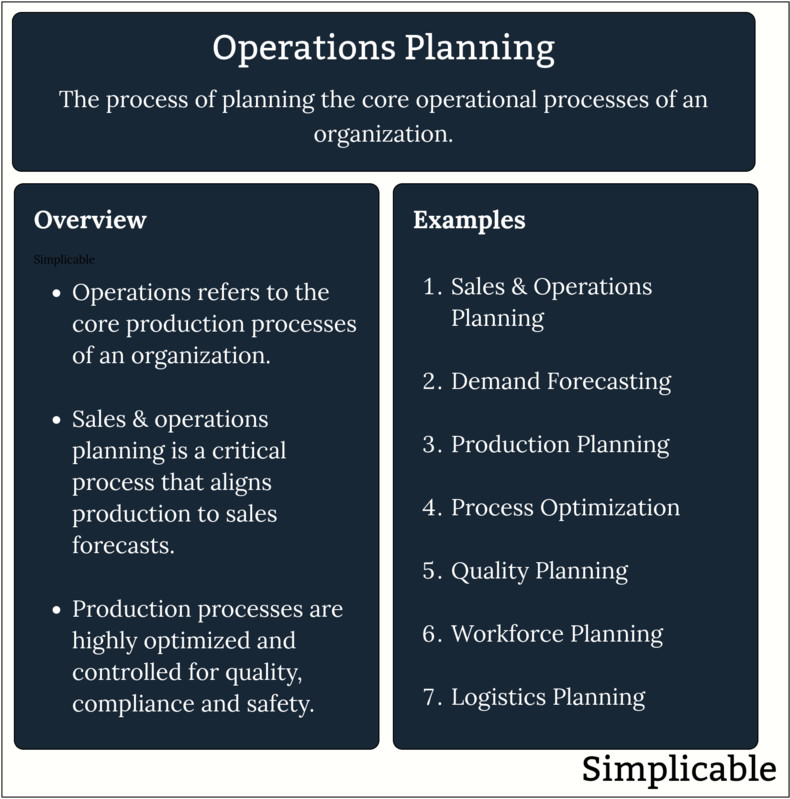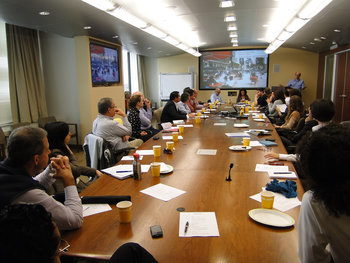
Operations strategy planning | Coordinating sales volumes and production volumes |
Forecasting customer demand | Goals for operations such as production levels |
Managing seasonal changes in demand | Operations budget planning and approvals |
Planning production schedules | Planning processes and process improvements |
Inventory management planning | Workforce and shift planning |
Planning staffing levels and recruiting | Capacity planning |
Procurement planning | Partner and supplier management planning |
Maintenance and modernization planning | Quality assurance planning |
Corrective action planning for problems | Plans to improve uptime and resilience |
Quality control planning | Operational risk management planning |
Contingency planning and disaster recover plans | Developing and improving operations technology |
Planning cost control or reduction initiatives | Operations metrics, reporting and benchmarking |
Developing and improving workplace safety controls | Environmental compliance planning |
Planning social and environmental improvement initiatives | Planning operational growth |
Planning new facilities | Planning to support new products and services |
Identifying and planning efficiency and performance improvements | Compliance and audit planning |
Business Plans
The operations plan section of a business plan includes details of how you will make proposed products and services a reality. This tends to be lightweight but broad and may include elements of human resources, information technology, manufacturing, supply chain, distribution and customer service. For example, an operations plan for an ice cream truck may include details of how ice cream will be procured, transported, stored and sold.Go-to-Market
A go-to-market strategy is a plan to launch a new product or service. This is typically formulated by a marketing team with the cooperation of operations. For example, a hotel that launches a new poolside cafe requires an operations plan to detail how supplies will be procured, food prepared and customer service provided.Risk Management
Risk management related planning such as a transportation company that has a goal to reduce accidents and incidents with improvements to its operations and infrastructure.Budget
Budget planning for an operations team. This includes an opex budget for the day-to-day costs of running a business and a capex budget for operations related investments. For example, a data center operations team that prepares an opex budget for running the facility for a year including elements such as salary, power and rent. The operations team may also prepare a capex budget to improve systems, hardware and infrastructure.Maintenance
Maintenance planning such as an energy company that creates a quarterly maintenance plan for cleaning and repairing solar panels and battery installations.Sales & Operations Planning
Sales and operations planning is the process of aligning sales forecasts with production. For example, if the sales team at cookware company plans a major promotion that will boost sales volumes by 200% they will first gain the agreement of operations that the firm's factories can increase production to this level.Production Planning
Production planning is the process of planning the output of an organization. This is often focused on utilizing capital and labor efficiently while producing goods that can be sold at a profitable level. For example, a soup manufacturer with one factory and 77 flavors of soup that plans production levels for each flavor. This requires a plan for organizing resources such as supplies, production lines, work shifts and warehouse space to achieve low unit costs.Projects
Project planning for operations related projects such as a manufacturing team that plans a project to replace aging industrial robots on a production line.Improvement
Operations produces a firm's revenue and often represents the most costly organizational function. As such, it tends to be heavily optimized with a process of measuring things, improving and measuring again. This is planned in terms of targets for management accounting metrics in areas such as cost, quality, business volumes and turnaround time.Capability Planning
Capability planning is the process of identifying what your business does and establishing a roadmap for improving and expanding these capabilities. For example, an airline that evaluates its current business capabilities and establishes a plan to improve its maintenance and flight operations to increase safety and reduce delays.Quality Management
Quality management is the process of controlling, measuring and improving the quality of an organization's processes, products and services. This is typically focused on operations. Planning for quality management involves establishing targets for quality metrics and developing actionable plans to achieve these metrics. For example, a hotel may have a target to improve customer satisfaction with improvements to housekeeping services such as a quality control inspection to ensure rooms are spotlessly clean.Asset Management
Asset management is the process of managing assets both tangible and intangible throughout their lifecycle. For example, an IT operations team that manages software assets over a lifecycle of development, launch, operation and retirement. Planning for asset management includes maintenance, evaluation of assets and plans to retire aging assets.Procurement
Planning for the identification, selection and management of suppliers and contractors. For example, a soup company that plans to procure 112 ingredients from diverse suppliers to support planned production levels.Supply Chain
Supply chain is the process of moving and storing supplies and finished products such as a furniture company that plans warehousing and transportation for supplies such as wood and finished products such as desks.Distribution
Distribution is the process of reaching the customer to deliver your products and services. For example, a French men's wear company that plans to distribute its products in Italy by establishing partnerships with local retailers. Distribution is a marketing function that requires operations support.Types
The following are the basic types of operations planning.
Summary
Operations planning relates to the core processes of an organization that are heavily optimized and controlled for quality and compliance.
| Overview: Operations Planning | ||
Type | ||
Definition | The process of establishing, expanding or improving the core day-to-day processes and practices of a business. | |
Related Concepts | ||











































